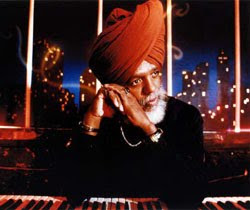 Béla Fleck, often considered the premiere banjo player in the world, has made a name for himself as a virtuoso instrumentalist unbounded by genre. His band The Flecktones - Victor Wooten on electric bass, Jeff Coffin on sax and flute, and Future Man on percussion - are equally talented and adventurous as Fleck himself, and together they have made a string of critically acclaimed albums that combine bluegrass, jazz, funk and world music with technical prowess, unlimited imagination and occasional zaniness. Their new holiday CD Jingle All the Way is all of that, with bells on - Christmas music as it's never been heard it before.
Béla Fleck, often considered the premiere banjo player in the world, has made a name for himself as a virtuoso instrumentalist unbounded by genre. His band The Flecktones - Victor Wooten on electric bass, Jeff Coffin on sax and flute, and Future Man on percussion - are equally talented and adventurous as Fleck himself, and together they have made a string of critically acclaimed albums that combine bluegrass, jazz, funk and world music with technical prowess, unlimited imagination and occasional zaniness. Their new holiday CD Jingle All the Way is all of that, with bells on - Christmas music as it's never been heard it before.Banjo master Béla Fleck and his Flecktones most previous CD, "The Hidden Land", is their third offering on Columbia Records, following "Outbound", and "Little Worlds". The album features a lot of new music as well as some tunes the group have performed for some time, but never recorded. This time they decided to use a stripped down quartet format, following some of the rules they used to use when they first began. For instance, no one could record anything that could not be played live, and no multiple overdubs or sweetening parts were added. Whatever you hear can be played by all four of the Flecktones at once, although at times it may sound like more than four guys! By triggering the occasional synth with a floor pedal or midi pick-up, and switching instruments, singing simultaneously with playing, etc they were able to get a pretty big sound.
Their last three releases had featured more of a 'community' approach, featuring great musicians like Bolinas-based reed player Paul McCandless of the group Oregon, Steel Drum player Andy Narell, tabla player Sandip Burman, and the Tuvan throat singer Cong-ar-ol Ondar, (last seen in the incredible documentary "Ghenghis Blues", with the late Paul Pena.), among others. The Flecktones loved having these myriad of stars to record and tour with, but Fleck reckoned this to be the right time for the group to return to it's original quartet format, and see what they could achieve.
Hidden Land is also a CD/DVD, which includes a 30 documentary minute film which gives even more insight into the inner workings of the Flecktones. "A big part of my year was finishing up the Flecktones upcoming CD "The Hidden Land", recalled Fleck. "This album is a return to a stripped down approach, in other words it is just the 4 of us. Everything we played had to be able to be duplicated live with just us, and we pushed ourselves to be creative and dig deep. We have made a lot of albums and we wanted this one to be different and special. Most importantly we wanted the music to progress. We recorded it in July and November of 2004 so that we could release it when we return from our year off. But there was a lot of work left to do editing and mixing, and I worked on it when I was off the road in 2005".
The Flecktones have indeed been busy while on their self-imposed hiatus. Following a successful summer tour with jazz icons, bassist Stanley Clarke and violinist Jean-Luc Ponty, Fleck spent a month in Africa, recording and filming musicians in an effort to discover the roots and origins of his beloved banjo. A tour of China, and followed that up by recording with the famed tabla master Zakir Hussein. Bass virtuoso Victor Wooten toured with his 'Soul Circus" band, his brother, the eclectic percussionist Roy "Futureman" Wooten, continued developing his "Royel" drum-piano, releasing his second solo CD, "Evolution de la Musique", and performing with keyboardist Jeremy "Street Maestro" Able. Saxophonist Jeff Coffin spent his time recording and touring with his acclaimed "Mu'tet", as well as joining his fellow 'tones on a variety of gigs and CD projects.
Hidden Land's 30 minute film, (which will be on the flip side of the new disc), was dreamt up by Fleck and his brother Sascha Paladino. "Sascha and I dreamed up a concept, and then the Flecktones got together for a couple of days to film it. We are all proud of the piece and look forward to you all checking it out", said Fleck. As of this writing, no Bay Area shows are planned, however, the Flecktones will be performing at the Sierra Nevada Stage, in Chico, California, February 13th and 14th.
With "The Hidden Land", Béla Fleck and the Flecktones continue to explore the myriad forms and possibilities of our planet's under-the-radar music while celebrating the invisible energy--both cosmic and mathematical--that uses sound to create new worlds, and marks a return to the original concept of the band, a radical jazz-bluegrass amalgam with roots as deep as the blues and branches reaching out into infinite space.
Bela Fleck and the Flecktones
Yoshi's San Francisco
Friday 8pm $45 / 10pm $45
Saturday 8pm SOLD OUT / 10pm $45
Sunday 7pm $45 / 9pm $45
